Swimmers 'ruined' by culture of fat-shaming and bullying
 Phoebe Lenderyou
Phoebe LenderyouA former Commonwealth youth gold medallist tipped for world success says she suffered with bulimia for years as a result of extreme criticism and humiliating weigh-ins by her swimming coaches.
Phoebe Lenderyou said she was just one of many swimmers who would regularly starve themselves before being weighed and that coaches would often blame poor performance in the pool on weight gain.
On one occasion, she said a group of athletes were "tested" by coaches who gave them chocolate cake and told them they had "failed" when they ate it.
She said she quit the sport with her "mentality ruined" and spent years trying to recover.
"I tell [stories] to my friends and family and they can't believe it. It's utterly disgraceful that it went on," she said.
The BBC has spoken to multiple swimmers, several parents, and coaches who allege mistreatment at clubs across England.
Allegations stretching back more than a decade include bullying, fat-shaming, emotional abuse, being allowed to train while injured, being belittled, an obsession with weight, and failing to tackle eating disorders.
'Winning medals but felt worthless'
Louise Graham, regional development manager for Swim England North East, said she was aware of multiple examples of victim-shaming and bullying, alongside an "outdated" attitude that athletes needed to toughen up to succeed.
"People uncritically adopt bad practice [that] 'if it was fine 20 years ago, it's fine now - this is what's required to be an Olympic champion and that's it'," she said. "But that view is so irresponsible and it needs to change."
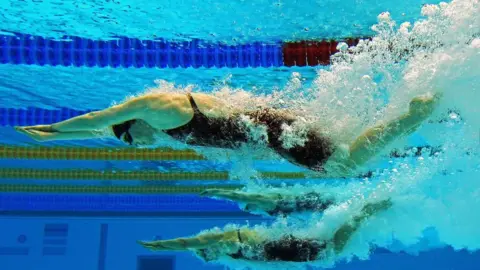 Getty Images
Getty ImagesIn February 2022 it was revealed by the BBC that Shropshire's elite Ellesmere College Titans swimming club would close following a year-long probe into more than 70 complaints from swimmers that included bullying, fat-shaming, emotional abuse and a failure to tackle self-harm.
Since then, the BBC has been inundated with reports of malpractice at all levels of the sport, although many victims are scared to speak out.
Allegations include:
- Swimmers losing so much weight their periods stopped
- One teenager being told to keep exercising with a broken rib so she could continue "fat-burning sessions"
- One club forcing children to train for hours without water on weigh-in days so fluid retention would not affect the scales
- Children sworn and shouted at for poor performance often linked to exhaustion and lack of nutrition
The BBC has also seen evidence that a machine used to track one swimmer's weight at the age of 15 had a false date of birth inputted for her because it was meant for adults only.
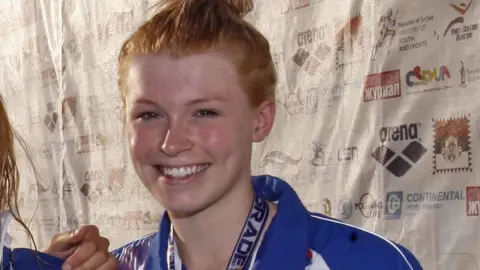 Getty Images
Getty ImagesFormer GB swimmer Phoebe won national competitions, competed in the European Juniors and secured gold at the Commonwealth Youth Games in 2011, making her "the one to watch". But she went from the highs of being on international podiums to being berated for her size.
Regular public weigh-ins and a restricted eating regime became an obsession she struggled to control and she suffered with bulimia and a binge eating disorder for five years.
"I was so lonely and very, very sad - I couldn't tell anyone what was happening and I just felt completely worthless," she said. "There was no way I could show any weakness so I just hid it."
Phoebe fell in love with swimming while at City of Newcastle Swimming Club, which has since been disbanded. At 16 she moved 400 miles from home to attend Plymouth College, which has a longstanding partnership with Plymouth Leander Swimming Club and describes itself as a "world-leading school for performance sport".
At one session, she said she was pulled aside and a coach pointed at parts of her body and told her she had gained weight "here, here and here".
"I just thought, 'well I've messed up now'," said Phoebe, who was at the time training relentlessly for world trials.
"I had bulimia all week and I had no energy at all. You just really get absorbed in a food obsession."
At intensive training centres run by British Swimming, Phoebe recalled children being in the pool for four hours, walking for two, and starving themselves before weigh-in days.
She said when a chocolate cake was put on the dinner table one evening, the swimmers devoured it.
A coach then told them it had been put there as a test - and they'd failed, Phoebe said.
"We just thought, 'oh my god, we are horrendous people'. You'd be consumed with guilt - you felt that if you'd eaten a treat it had stopped you getting to where you wanted to be."
 Phoebe Lenderyou
Phoebe LenderyouPhoebe quit in her second year at Plymouth, her "mentality ruined due to the constant disappointment". She only began swimming again when she moved to Canada and found a supportive coach.
"He was amazing, he just wanted me to be happy," she said. "The conversation around food was really positive, making sure you were well-fuelled and not tired."
Plymouth College said it had no records of concerns or complaints into coaching practices, adding it took swimming "extremely seriously" and had every confidence in Plymouth Leander's training.
'I used to swim through tears'
Other swimmers have told the BBC their coaches' "obsession" with calorie counting had left them with unhealthy relationships with food.
Zara, who competed nationally with a club in the north of England, lost almost half a stone in three weeks while on a foreign trip with her coach because she was scared to eat in front of him.
"The focus was always on our weight," she said. "We didn't have a nutritionist or anything - it was just calorie counting all the time."
When she shed almost 7.8lb (3.5kg) after a bout of flu, she said she was praised for the dramatic weight loss.
"A lot of swimmers had anorexic and binge-eating habits," she said. "Some didn't have periods for a year because they lost so much weight."
She said they would be berated for swimming poorly which was often because they were exhausted from training 20 hours a week on a poor diet.
"I used to swim through tears," she said.
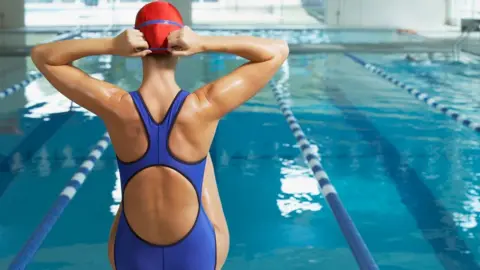 Getty Images
Getty ImagesZara, who does not want to be identified for fear of repercussions, had been on the path to becoming a top British swimmer but left the sport because of the damage it caused her.
"When you are that young you don't think there's anything wrong with it. Then you start to get a voice at 17, 18, and you learn that these things aren't right."
Another swimmer told the BBC she thought her dreams had come true when she joined a renowned swimming club but ended up terrified of eating the "wrong" thing and feared her coach.
Sophie, not her real name, was ordered to attend extra fat-burning sessions and would regularly have panic attacks about missing her 05:00 alarm.
When she suffered broken ribs in a fall, she trained in agony because she was too scared to tell her coach, then when she did she was told to go on an exercise bike instead to keep "burning fat".
She said she had been left with food issues more than four years after quitting.
"It broke my spirit - it broke my dreams. There's a bit of me that's still upset today," she said.
"Even now, I try to put a swimming costume on and I can't do it."
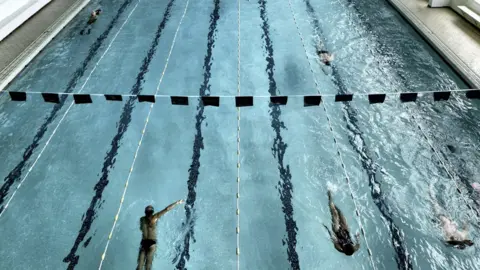 Getty Images
Getty ImagesFollowing the probe into Ellesmere Titans, which found swimmers had suffered eating disorders as a result of the club's public weighing regime of children as young as 10, the sport's governing body Swim England has said swimmers under 18 should not be weighed unless on a designated path to the Olympics or Commonwealth Games.
Maria, who used to swim at Titans, said she had a "complete breakdown" because of the abuse she suffered at the club, where the investigation found swimmers were routinely shouted and sworn at.
The experience meant the ex-swimmer, who is still involved in the sport and does not want to be identified, said she had learnt "how not to work with children".
"You would just never swear at a child if you thought they could do better."
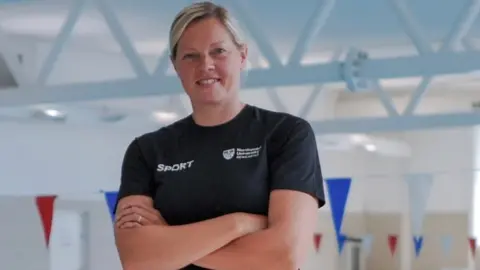
Ms Graham, who has researched coach development and led lectures on the subject at Staffordshire University, said it was vital the sport reviewed its methods to ensure it was not causing swimmers harm.
"Elite athletes are told 'if you miss a session, you're a failure - you have to sacrifice everything to be a success'," she said.
"But this is an endurance sport and… teenagers who are swimming 16-plus hours a week are already making huge sacrifices."
She added that performance "doesn't always have to be amazing - it's got to be realistic to life".
"You can't have children getting up at 4.30 in the morning and getting negative comments immediately. It's about building them up, not knocking them down."
Swim England said it had a "primary duty of care to safeguard the physical and emotional health of our members".
"This is an issue we take extremely seriously as the welfare, health and wellbeing of athletes is paramount," it said.
"We recognise there will be instances where coaching behaviours fall short of expectations and we are committed to addressing these.
"We are reaching out to younger members, asking them for their direct feedback on a number of safeguarding and welfare issues, and bullying will be one of those topics they can directly comment on."
 Phoebe Lenderyou
Phoebe Lenderyou The organisation, which is undergoing a review into its complaints process following the closure of Ellesmere Titans, said it now had "more robust" processes in place and was due to publish a new safeguarding, welfare and culture action plan.
Phoebe, now, 27, said she hoped swimmers would get more support in the future but feared even now she would be criticised for speaking out.
"This has been going on for years and we should be able to talk about it. They say you need to act like an athlete - but they forget you are also a child."
Follow BBC West Midlands on Facebook, Twitter and Instagram. Send your story ideas to: [email protected]
